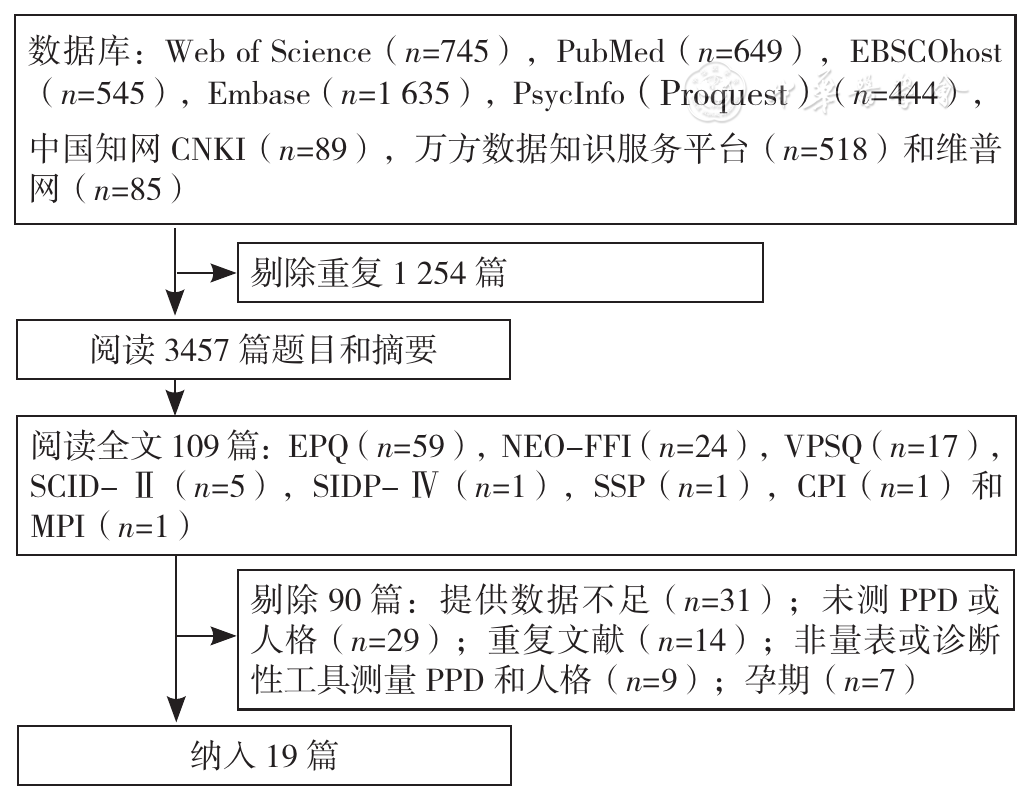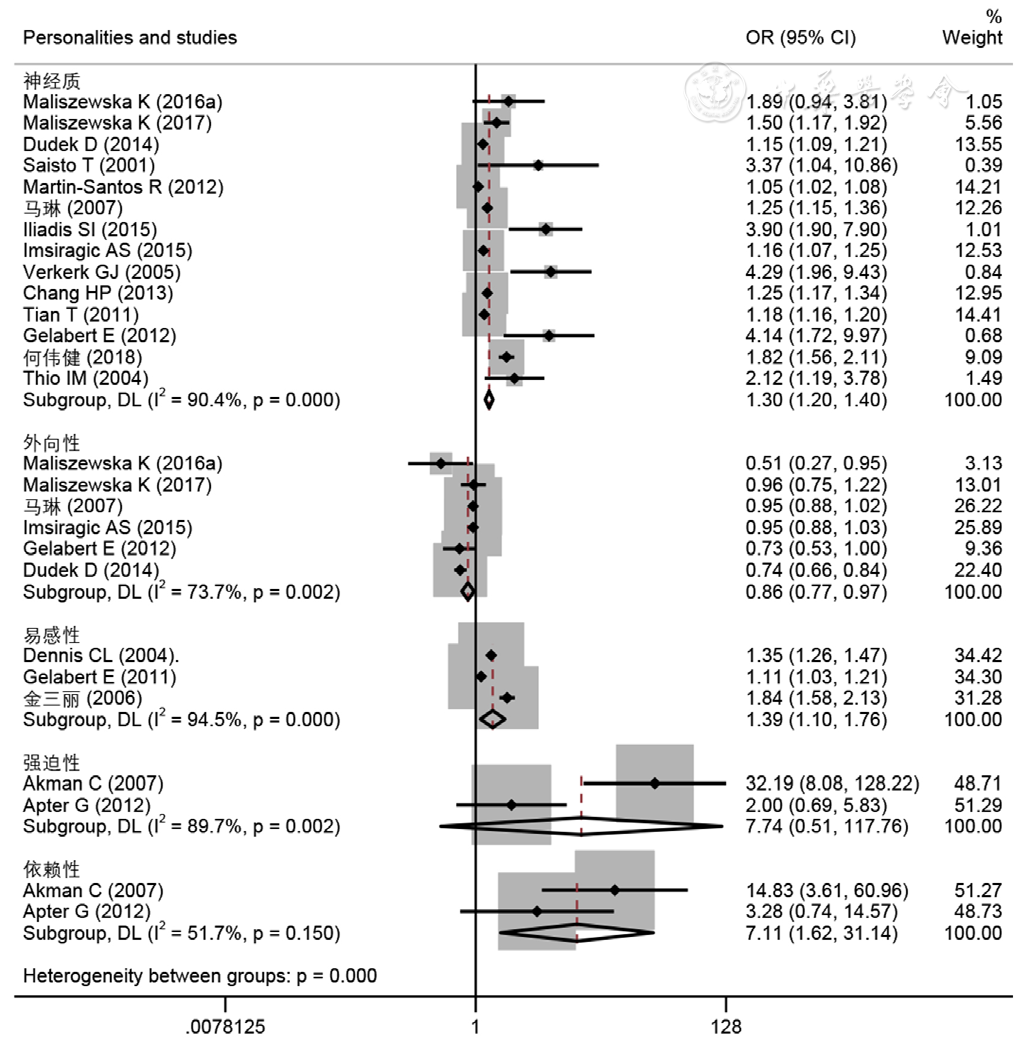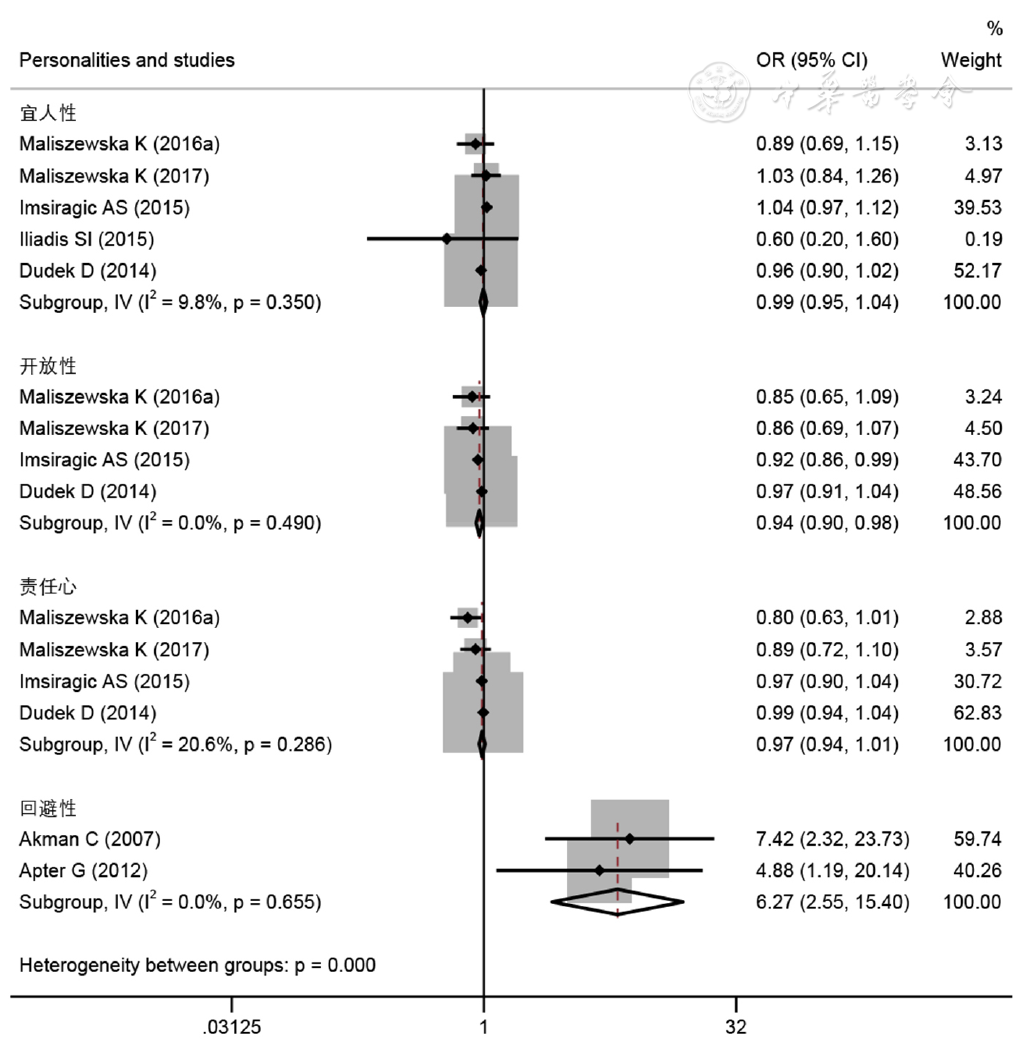中国全科医学 ›› 2023, Vol. 26 ›› Issue (14): 1775-1782.DOI: 10.12114/j.issn.1007-9572.2022.0726
所属专题: 精神卫生最新文章合辑; 心理健康最新文章合辑
收稿日期:2022-08-26
修回日期:2023-01-10
出版日期:2023-05-15
发布日期:2023-02-03
通讯作者:
李玉红
基金资助:
YUAN Dehui1, LI Yuhong1,*( ), DONG Yuanyuan2, WANG Minghuan1
), DONG Yuanyuan2, WANG Minghuan1
Received:2022-08-26
Revised:2023-01-10
Published:2023-05-15
Online:2023-02-03
Contact:
LI Yuhong
摘要: 背景 产后抑郁和人格问题对母婴健康有不良影响,目前对不同人格特质和产后抑郁关系的研究结果尚存争议,且国内缺乏系统评价。目的 系统评价不同人格特质与产后抑郁的关系。方法 计算机检索Web of Science、PubMed、EBSCOhost、Embase、PsycInfo(Proquest)、中国知网、万方数据知识服务平台和维普网。检索自建库至2021-06-04有关不同人格特质与产后抑郁关系的研究。文献质量评价后,提取相关数据。运用Stata 16.0进行Meta分析。对神经质与产后抑郁的关系进行亚组分析和发表偏倚检验。使用翻转效应模型对不同人格特质和产后抑郁的关系进行敏感性分析。结果 最终纳入19篇文献和9类人格特质进行Meta分析,包括神经质(14篇)、外向性(6篇)、宜人性(5篇)、开放性(4篇)、责任心(4篇)、易感人格(3篇)、强迫性人格障碍(2篇)、回避性(2篇)和依赖性(2篇)。Meta分析结果显示:人格特质中的神经质〔OR=1.30,95%CI(1.20,1.40)〕、易感性〔OR=1.39,95%CI(1.10,1.76)〕、回避性〔OR=6.27,95%CI(2.55,15.40)〕和依赖性〔OR=7.11,95%CI(1.62,31.14)〕是产后抑郁的危险因素(P<0.05),外向性〔OR=0.86,95%CI(0.77,0.97)〕、开放性〔OR=0.94,95%CI(0.90,0.98)〕是产后抑郁的保护因素(P<0.05)。亚组分析结果显示,爱丁堡产后抑郁量表(EPDS)的临界值不同(EPDS≥12分:OR=1.71,EPDS≥9分:OR=1.14;P=0.028)以及产后抑郁的调查时间不同(<产后1周:OR=1.13,产后2~12周:OR=1.33,≥产后13周:OR=2.22;P=0.008)是合并结果的异质性来源。敏感性分析结果显示,除强迫性人格外,其他人格特质的合并结果可靠。结论 人格特质类型对产后抑郁有着不同的影响,其中人格特质中的神经质和易感性是产后抑郁的危险因素;人格特质中的外向性和开放性是产后抑郁的保护因素;神经质个性的产妇的产后抑郁可能更严重,且更可能在产后13周以后发生产后抑郁。因国内外研究结果尚不一致,未来还需进一步探讨回避性、依赖性和强迫性人格障碍和产后抑郁的关系。

图1 文献筛选流程图注:EPQ=艾森克人格问卷,NEO-FFI=大五人格问卷,VPSQ=易感人格风格问卷,SCID-Ⅱ=《美国精神疾病诊断与统计手册》修订版第三版结构化访谈,SIDP-Ⅳ=《美国精神障碍诊断与统计手册》第四版人格障碍结构化访谈,SSP=瑞典大学人格量表,CPI=加州心理调查表,MPI=莫兹利人格问卷
Figure 1 Literatures screening flowchart
| 第一作者 | 发表时间(年) | 国家 | 产后调查时间点 | PPD测量工具 | 人格测量工具 | 纳入变量 | 研究设计 | 样本量(例) | 质量评价(分) |
|---|---|---|---|---|---|---|---|---|---|
| MALISZEWSKA[ | 2016 | 波兰 | 1周 | EPDS≥13分 | NEO-FFI | N、E、O、A、C | 横断面研究 | 101 | 8 |
| MALISZEWSKA[ | 2017 | 波兰 | 4~8周 | EPDS≥13分 | NEO-FFI | N、E、O、A、C | 横断面研究 | 387 | 8 |
| DUDEK[ | 2014 | 波兰 | 1周 | EPDS≥13分 | NEO-FFI | N、E、O、A、C | 横断面研究 | 344 | 8 |
| SAISTO[ | 2001 | 芬兰 | 2~3个月 | BDI-Ⅱ | NEO-PI | N | 队列研究 | 211 | 7 |
| MARTIN-SANTOS[ | 2012 | 西班牙 | 8周、32周 | EPDS>9、DIGS | EPQ | N | 队列研究 | 1 407 | 7 |
| 马琳[ | 2007 | 中国 | 6周 | EPDS≥9分 | EPQ | N、E | 横断面研究 | 237 | 8 |
| ILIADIS[ | 2015 | 瑞典 | 6周、6个月 | EPDS≥12分 | SSP | N、A | 队列研究 | 975 | 7 |
| IMSIRAGIC[ | 2014 | 克罗地亚 | 3~5 d、6~9周 | EPDS≥9 | NEO-FFI | N、E、O、A、C | 队列研究 | 262 | 7 |
| VERKERK[ | 2005 | 荷兰 | 3、6、12个月 | RDC | CPI | N | 队列研究 | 277 | 7 |
| CHANG[ | 2014 | 中国 | 产后 | CES-D | MPI | N | 病例对照研究 | 213 | 8 |
| TIAN[ | 2012 | 中国 | 产后 | DSM-Ⅳ | EPQ | N | 病例对照研究 | 4 567 | 8 |
| GELABERT[ | 2012 | 西班牙 | 6个月 | DSM-Ⅳ | EPQ | N、E | 病例对照研究 | 237 | 8 |
| 何伟健[ | 2018 | 中国 | 6个月 | PDSS≥60分 | EPQ | N | 病例对照研究 | 380 | 6 |
| THIO[ | 2001 | 新西兰 | 产后 | EPDS>12分 | EPQ | N | 横断面研究 | 225 | 7 |
| AKMAN[ | 2007 | 土耳其 | 6周 | SCID-Ⅰ | SCID-Ⅱ | AV、OC、D | 队列研究 | 302 | 6 |
| APTER[ | 2012 | 法国 | 12周 | MADRS | SIDP-Ⅳ | AV、OC、D | 队列研究 | 109 | 6 |
| DENNIS[ | 2004 | 哥伦比亚 | 1、4、8周 | EPDS>12分 | VPSQ | V | 队列研究 | 498 | 5 |
| GELABERT[ | 2011 | 西班牙 | 8周 | DIGS | VPSQ | V | 队列研究 | 302 | 6 |
| 金三丽[ | 2006 | 中国 | 6周 | EPDS≥10分 | VPSQ | V | 队列研究 | 349 | 5 |
表1 纳入研究的基本特征和质量评价结果
Table 1 Basic characteristics and quality evaluation results of included studies
| 第一作者 | 发表时间(年) | 国家 | 产后调查时间点 | PPD测量工具 | 人格测量工具 | 纳入变量 | 研究设计 | 样本量(例) | 质量评价(分) |
|---|---|---|---|---|---|---|---|---|---|
| MALISZEWSKA[ | 2016 | 波兰 | 1周 | EPDS≥13分 | NEO-FFI | N、E、O、A、C | 横断面研究 | 101 | 8 |
| MALISZEWSKA[ | 2017 | 波兰 | 4~8周 | EPDS≥13分 | NEO-FFI | N、E、O、A、C | 横断面研究 | 387 | 8 |
| DUDEK[ | 2014 | 波兰 | 1周 | EPDS≥13分 | NEO-FFI | N、E、O、A、C | 横断面研究 | 344 | 8 |
| SAISTO[ | 2001 | 芬兰 | 2~3个月 | BDI-Ⅱ | NEO-PI | N | 队列研究 | 211 | 7 |
| MARTIN-SANTOS[ | 2012 | 西班牙 | 8周、32周 | EPDS>9、DIGS | EPQ | N | 队列研究 | 1 407 | 7 |
| 马琳[ | 2007 | 中国 | 6周 | EPDS≥9分 | EPQ | N、E | 横断面研究 | 237 | 8 |
| ILIADIS[ | 2015 | 瑞典 | 6周、6个月 | EPDS≥12分 | SSP | N、A | 队列研究 | 975 | 7 |
| IMSIRAGIC[ | 2014 | 克罗地亚 | 3~5 d、6~9周 | EPDS≥9 | NEO-FFI | N、E、O、A、C | 队列研究 | 262 | 7 |
| VERKERK[ | 2005 | 荷兰 | 3、6、12个月 | RDC | CPI | N | 队列研究 | 277 | 7 |
| CHANG[ | 2014 | 中国 | 产后 | CES-D | MPI | N | 病例对照研究 | 213 | 8 |
| TIAN[ | 2012 | 中国 | 产后 | DSM-Ⅳ | EPQ | N | 病例对照研究 | 4 567 | 8 |
| GELABERT[ | 2012 | 西班牙 | 6个月 | DSM-Ⅳ | EPQ | N、E | 病例对照研究 | 237 | 8 |
| 何伟健[ | 2018 | 中国 | 6个月 | PDSS≥60分 | EPQ | N | 病例对照研究 | 380 | 6 |
| THIO[ | 2001 | 新西兰 | 产后 | EPDS>12分 | EPQ | N | 横断面研究 | 225 | 7 |
| AKMAN[ | 2007 | 土耳其 | 6周 | SCID-Ⅰ | SCID-Ⅱ | AV、OC、D | 队列研究 | 302 | 6 |
| APTER[ | 2012 | 法国 | 12周 | MADRS | SIDP-Ⅳ | AV、OC、D | 队列研究 | 109 | 6 |
| DENNIS[ | 2004 | 哥伦比亚 | 1、4、8周 | EPDS>12分 | VPSQ | V | 队列研究 | 498 | 5 |
| GELABERT[ | 2011 | 西班牙 | 8周 | DIGS | VPSQ | V | 队列研究 | 302 | 6 |
| 金三丽[ | 2006 | 中国 | 6周 | EPDS≥10分 | VPSQ | V | 队列研究 | 349 | 5 |

图2 人格特质的神经质、外向性、易感性、强迫性和依赖性对PPD影响的森林图(随机效应模型)
Figure 2 Forest plot of the effects of neuroticism,extraversion,vulnerability,obsessive-compulsive personality and dependent personality on PPD(Random-effect model)

图3 人格特质的开放性、责任心、宜人性与回避性对PPD影响的森林图(固定效应模型)
Figure 3 Forest plot of the effects of openness,conscientiousness,agreeableness and avoidant personality on PPD(Fixed-effect model)
| 研究项目 | 分组 | 纳入篇数(篇) | 异质性(I2) | PI | OR(95%CI) | PD |
|---|---|---|---|---|---|---|
| 地区 | 欧洲 | 10[ | 85.80% | <0.001 | 1.34(1.18,1.52) | 0.851 |
| 亚洲 | 4[ | 91.30% | <0.001 | 1.32(1.18,1.48) | ||
| PPD测量工具 | EPDS | 8[ | 84.30% | <0.001 | 1.23(1.11,1.36) | 0.090 |
| 其他 | 7[ | 92.20% | <0.001 | 1.50(1.25,1.79) | ||
| 神经质测量工具 | NEO-FFI | 5[ | 56.70% | 0.055 | 1.22(1.10,1.35) | 0.221 |
| EPQ | 6[ | 95.00% | <0.001 | 1.30(1.17,1.45) | ||
| 其他 | 3[ | 89.40% | <0.001 | 2.60(1.00,6.76) | ||
| EPDS阈值 | EPDS≥12分 | 5[ | 81.00% | <0.001 | 1.71(1.22,2.41) | 0.028 |
| EPDS≥9分 | 3[ | 89.40% | <0.001 | 1.14(1.02,1.28) | ||
| PPD时间 | <产后1周 | 3[ | 40.20% | 0.188 | 1.13(1.03,1.24) | 0.008 |
| 产后2~12周 | 7[ | 88.30% | <0.001 | 1.33(1.13,1.57) | ||
| ≥产后13周 | 5[ | 95.00% | <0.001 | 2.22(1.38,3.58) | ||
| 研究设计 | 横断面 | 5[ | 66.40% | 0.018 | 1.29(1.14,1.45) | 0.604 |
| 队列 | 5[ | 86.30% | <0.001 | 1.42(1.10,1.82) | ||
| 病例对照 | 4[ | 92.70% | <0.001 | 1.41(1.20,1.67) |
表2 神经质与PPD关系的亚组分析
Table 2 Subgroup analysis of the relationship between neuroticism and PPD
| 研究项目 | 分组 | 纳入篇数(篇) | 异质性(I2) | PI | OR(95%CI) | PD |
|---|---|---|---|---|---|---|
| 地区 | 欧洲 | 10[ | 85.80% | <0.001 | 1.34(1.18,1.52) | 0.851 |
| 亚洲 | 4[ | 91.30% | <0.001 | 1.32(1.18,1.48) | ||
| PPD测量工具 | EPDS | 8[ | 84.30% | <0.001 | 1.23(1.11,1.36) | 0.090 |
| 其他 | 7[ | 92.20% | <0.001 | 1.50(1.25,1.79) | ||
| 神经质测量工具 | NEO-FFI | 5[ | 56.70% | 0.055 | 1.22(1.10,1.35) | 0.221 |
| EPQ | 6[ | 95.00% | <0.001 | 1.30(1.17,1.45) | ||
| 其他 | 3[ | 89.40% | <0.001 | 2.60(1.00,6.76) | ||
| EPDS阈值 | EPDS≥12分 | 5[ | 81.00% | <0.001 | 1.71(1.22,2.41) | 0.028 |
| EPDS≥9分 | 3[ | 89.40% | <0.001 | 1.14(1.02,1.28) | ||
| PPD时间 | <产后1周 | 3[ | 40.20% | 0.188 | 1.13(1.03,1.24) | 0.008 |
| 产后2~12周 | 7[ | 88.30% | <0.001 | 1.33(1.13,1.57) | ||
| ≥产后13周 | 5[ | 95.00% | <0.001 | 2.22(1.38,3.58) | ||
| 研究设计 | 横断面 | 5[ | 66.40% | 0.018 | 1.29(1.14,1.45) | 0.604 |
| 队列 | 5[ | 86.30% | <0.001 | 1.42(1.10,1.82) | ||
| 病例对照 | 4[ | 92.70% | <0.001 | 1.41(1.20,1.67) |
| 纳入变量 | 固定效应模型 | 随机效应模型 |
|---|---|---|
| 神经质 | 1.16(1.14,1.17) | 1.30(1.20,1.40) |
| 外向性 | 0.91(0.86,0.95) | 0.86(0.77,0.97) |
| 易感性 | 1.29(1.23,1.36) | 1.39(1.10,1.76) |
| 开放性 | 0.94(0.90,0.98) | 0.94(0.90,0.98) |
| 责任心 | 0.97(0.92,1.02) | 0.97(0.94,1.01) |
| 宜人性 | 0.99(0.94,1.04) | 0.99(0.95,1.04) |
| 强迫性 | 5.67(2.43,13.21) | 7.74(0.51,117.76) |
| 依赖性 | 7.26(2.60,20.24) | 7.11(1.62,31.14) |
| 回避性 | 6.27(2.55,15.40) | 6.27(2.55,15.40) |
表3 不同人格特质与产后抑郁关系的敏感性分析〔OR(95%CI)〕
Table 3 Sensitivity analysis of the relationship between different personality traits and PPD
| 纳入变量 | 固定效应模型 | 随机效应模型 |
|---|---|---|
| 神经质 | 1.16(1.14,1.17) | 1.30(1.20,1.40) |
| 外向性 | 0.91(0.86,0.95) | 0.86(0.77,0.97) |
| 易感性 | 1.29(1.23,1.36) | 1.39(1.10,1.76) |
| 开放性 | 0.94(0.90,0.98) | 0.94(0.90,0.98) |
| 责任心 | 0.97(0.92,1.02) | 0.97(0.94,1.01) |
| 宜人性 | 0.99(0.94,1.04) | 0.99(0.95,1.04) |
| 强迫性 | 5.67(2.43,13.21) | 7.74(0.51,117.76) |
| 依赖性 | 7.26(2.60,20.24) | 7.11(1.62,31.14) |
| 回避性 | 6.27(2.55,15.40) | 6.27(2.55,15.40) |
| [1] |
|
| [2] |
|
| [3] |
|
| [4] |
|
| [5] |
|
| [6] |
|
| [7] |
|
| [8] |
|
| [9] |
|
| [10] |
|
| [11] |
|
| [12] |
|
| [13] |
|
| [14] |
|
| [15] |
|
| [16] |
|
| [17] |
|
| [18] |
|
| [19] |
|
| [20] |
|
| [21] |
|
| [22] |
|
| [23] |
|
| [24] |
|
| [25] |
|
| [26] | |
| [27] |
|
| [28] |
|
| [29] |
|
| [30] |
|
| [31] |
何伟健,方俊,李丽美,等. 生育二胎妇女产后6个月抑郁症及相关因素调查[J]. 临床精神医学杂志,2018,28(1):51-53. DOI:10.3969/j.issn.1005-3220.2018.01.018.
|
| [32] |
|
| [33] |
|
| [34] | |
| [35] |
|
| [36] |
|
| [37] |
马郑豫,苏志强,张大均. 抑郁素质—压力理论在童年期的适用性:一项纵向研究[J]. 中国临床心理学杂志,2018,26(5):960-965. DOI:10.16128/j.cnki.1005-3611.2018.05.027.
|
| [38] |
|
| [39] |
张红梅,徐英,李一云,等. 生活事件、社会支持、个性因素及产前心理状态对产后抑郁症的影响[J]. 中国慢性病预防与控制,2007,15(4):321-325. DOI:10.3969/j.issn.1004-6194.2007.04.007.
|
| [40] |
|
| [41] |
|
| [42] |
|
| [43] |
宋玉萍,孙宏伟,宋瑞荣,等. 产妇人格与应对方式对产后抑郁情绪的影响[J]. 中华行为医学与脑科学杂志,2010,19(11):994-995. DOI:10.3760/cma.j.issn.1674-6554.2010.11.013.
|
| [44] |
|
| [45] |
|
| [46] |
高成阁,王赞利,纪术茂,等. 缓解期重性抑郁与心境恶劣患者人格特征及人格障碍研究[J]. 中国临床心理学杂志,2003,11(3):176-179. DOI:10.3969/j.issn.1005-3611.2003.03.006.
|
| [47] |
|
| [48] | |
| [49] |
郭刚军,马慧. 大学生抑郁情绪与人格的关系:应对方式的中介和调节效应[J]. 中国健康心理学杂志,2022,30(3):426-431. DOI:10.13342/j.cnki.cjhp.2022.03.022.
|
| [50] |
凌宇,杨娟,蚁金瑶. 沉思在高中生神经质人格与抑郁症状关系中的中介效应[J]. 中国临床心理学杂志,2013,21(4):605-608. DOI:10.16128/j.cnki.1005-3611.2013.04.004.
|
| [51] |
圣锦涛,王金辉. 青少年神经质人格与抑郁的关系:移情的中介作用[J]. 中国健康心理学杂志,2015,23(10):1444-1447. DOI:10.13342/j.cnki.cjhp.2015.10.002.
|
| [52] |
|
| [1] | 许佳兰, 阎红, 文君, 周紫彤, 王思宇. 老年癌症患者潜在不适当用药发生率的Meta分析[J]. 中国全科医学, 2025, 28(30): 3815-3822. |
| [2] | 张天宇, 于海搏, 陈飞, 李新, 张佳佳, 詹晓凯, 申曼, 汤然, 范斯斌, 赵凤仪, 黄仲夏. POEMS综合征全身系统性治疗疗效和安全性的Meta分析[J]. 中国全科医学, 2025, 28(27): 3447-3455. |
| [3] | 全家霖, 朱琳, 苏煜, 陈泽恺, 陈梓淇, 张卓凡. 运动方式对超重或肥胖儿童青少年执行功能改善效果的网状Meta分析[J]. 中国全科医学, 2025, 28(27): 3422-3431. |
| [4] | 蒋世华, 朱政, 任盈盈, 朱垚磊, 王越, 高希彬. 中国儿童青少年近视患病率及影响因素的Meta分析[J]. 中国全科医学, 2025, 28(24): 3043-3052. |
| [5] | 李浩, 李江涛, 刘丹, 王建军. 贝利尤单抗和阿尼鲁单抗及泰它西普治疗系统性红斑狼疮疗效和安全性的网状Meta分析[J]. 中国全科医学, 2025, 28(23): 2924-2933. |
| [6] | 王笑林, 李秋月, 周彦君, 张金辉, 梁涛. 转移性结直肠癌患者呋喹替尼治疗相关心血管毒性发生率和风险的Meta分析[J]. 中国全科医学, 2025, 28(23): 2934-2940. |
| [7] | 马盼盼, 王思静, 游娜, 丁大法, 鲁一兵. Danuglipron与Orforglipron治疗2型糖尿病疗效及安全性的Meta分析[J]. 中国全科医学, 2025, 28(21): 2679-2685. |
| [8] | 胡婉琴, 余深艳, 曹学华, 向凤, 贾钰. 中国儿童性早熟影响因素的Meta分析[J]. 中国全科医学, 2025, 28(21): 2661-2671. |
| [9] | 阿迪力·吐尔孙, 程刚. 非奈利酮治疗2型糖尿病肾病有效性和安全性的Meta分析[J]. 中国全科医学, 2025, 28(21): 2686-2691. |
| [10] | 郭盛滕, 张芬芬, 万迪, 于冬梅, 王庆华. 重症急性胰腺炎并发急性肺损伤危险因素的Meta分析[J]. 中国全科医学, 2025, 28(20): 2546-2554. |
| [11] | 王碧晴, 张萍, 杨红霞, 王倩, 鞠春晓, 赵俊男, 梅俊, 张颖, 徐凤芹. 中国老年高血压患者轻度认知障碍患病率及发展趋势的Meta分析[J]. 中国全科医学, 2025, 28(17): 2186-2192. |
| [12] | 樊宇, 李蓉, 龚双英, 杨小娟, 李蕊. 中国产妇配偶产后抑郁发生率的Meta分析[J]. 中国全科医学, 2025, 28(17): 2179-2185. |
| [13] | 何芸, 范焕芳, 马盼, 许绍青, 杨柳, 金明哲, 张明蕊, 陈佳琪. 不同针灸治疗方式干预乳腺癌术后上肢淋巴水肿效果的网状Meta分析[J]. 中国全科医学, 2025, 28(14): 1788-1794. |
| [14] | 朱胜杰, 刁华琼, 杭晓屹, 孙文军. 不同中成药注射液治疗后循环缺血性眩晕效果的网状Meta分析[J]. 中国全科医学, 2025, 28(14): 1795-1808. |
| [15] | 王晓雨, 冯贞贞, 王军, 郭小川, 李建生. 急性呼吸窘迫综合征患者并发急性肾损伤危险因素的系统评价[J]. 中国全科医学, 2025, 28(12): 1527-1537. |
| 阅读次数 | ||||||
|
全文 |
|
|||||
|
摘要 |
|
|||||





